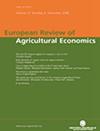克里米亚吞并对农业贸易的影响:结构重力方法
IF 3.5
2区 经济学
Q2 AGRICULTURAL ECONOMICS & POLICY
引用次数: 0
摘要
我们研究了 2014 年俄罗斯吞并克里米亚对全球农产品贸易流动的影响。通过使用泊松伪最大似然(PPML)估计器和国内销售的结构重力模型,我们区分了战争和制裁对贸易的影响。我们估算了有条件的一般均衡 PPML 反事实情景,并采用 "常规两步法 "评估了俄罗斯、乌克兰和欧盟成员国的贸易潜力。我们的结果表明,虽然俄罗斯和乌克兰的贸易流量在后兼并时期都受益匪浅,但制裁却产生了负面影响,俄罗斯受到的影响更为严重。本文章由计算机程序翻译,如有差异,请以英文原文为准。
The impact of the Crimea annexation on agricultural trade: A structural gravity approach
We examine the impact of the 2014 Russian annexation of Crimea on global agricultural trade flows. Using a structural gravity model with a Poisson Pseudo Maximum Likelihood (PPML) estimator and intra-country sales, we differentiate the effects of the war from those of the sanctions on trade. We estimate conditional General Equilibrium PPML counterfactual scenarios and apply a “conventional two-step approach” to assess trade potential for Russia, Ukraine and European Union members. Our results suggest that while both Russia’s and Ukraine’s trade flows benefited during the post-annexation period, sanctions had a negative impact, with Russia experiencing more severe effects.
求助全文
通过发布文献求助,成功后即可免费获取论文全文。
去求助
来源期刊

European Review of Agricultural Economics
管理科学-农业经济与政策
CiteScore
6.60
自引率
5.90%
发文量
25
审稿时长
>24 weeks
期刊介绍:
The European Review of Agricultural Economics serves as a forum for innovative theoretical and applied agricultural economics research.
The ERAE strives for balanced coverage of economic issues within the broad subject matter of agricultural and food production, consumption and trade, rural development, and resource use and conservation. Topics of specific interest include multiple roles of agriculture; trade and development; industrial organisation of the food sector; institutional dynamics; consumer behaviour; sustainable resource use; bioenergy; agricultural, agri-environmental and rural policy; specific European issues.
Methodological articles are welcome. All published papers are at least double peer reviewed and must show originality and innovation. The ERAE also publishes book reviews.
 求助内容:
求助内容: 应助结果提醒方式:
应助结果提醒方式:


